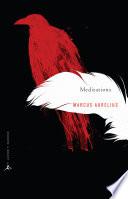Quotes from book
Meditations

Meditations is a series of personal writings by Marcus Aurelius, Roman Emperor from 161 to 180 AD, recording his private notes to himself and ideas on Stoic philosophy.

“The universe is change; our life is what our thoughts make it.”
The universe is flux, life is opinion.
The universe is transformation: life is opinion. (Long translation)
ὁ κόσμος ἀλλοίωσις, ὁ βίος ὑπόληψις.
IV, 3
Variant: Our life is what our thoughts make it.
Source: Meditations (c. 121–180 AD), Book IV

“How much more grievous are the consequences of anger than the causes of it.”
Source: Meditations (Promluvy k sobě)

“Persevere then until thou shalt have made these things thy own”
X, 31
Meditations (c. 121–180 AD), Book X
Context: What matter and opportunity [for thy activity] art thou avoiding? For what else are all these things, except exercises for the reason, when it has viewed carefully and by examination into their nature the things which happen in life? Persevere then until thou shalt have made these things thy own, as the stomach which is strengthened makes all things its own, as the blazing fire makes flame and brightness out of everything that is thrown into it.

X, 12
Meditations (c. 121–180 AD), Book X
Context: What need is there of suspicious fear, since it is in thy power to inquire what ought to be done? And if thy seest clear, go by this way content, without turning back: but if thy dost not see clear, stop and take the best advisers. But if any other things oppose thee, go on according to thy powers with due consideration, keeping to that which appears to be just. For it is best to reach this object, and if thou dost fail, let thy failure be in attempting this. He who follows reason in all things is both tranquil and active at the same time, and also cheerful and collected.

“There are three relations [between thee and other things]:”
VIII, 27
Meditations (c. 121–180 AD), Book VIII
Context: There are three relations [between thee and other things]: the one to the body which surrounds thee; the second to the divine cause from which all things come to all; and the third to those who live with thee.

“For what else are all these things, except exercises for the reason”
X, 31
Meditations (c. 121–180 AD), Book X
Context: What matter and opportunity [for thy activity] art thou avoiding? For what else are all these things, except exercises for the reason, when it has viewed carefully and by examination into their nature the things which happen in life? Persevere then until thou shalt have made these things thy own, as the stomach which is strengthened makes all things its own, as the blazing fire makes flame and brightness out of everything that is thrown into it.

“Love the little trade which thou hast learned, and be content therewith.”
IV, 31
Meditations (c. 121–180 AD), Book IV

“Whatever happens at all happens as it should; you will find this true, if you watch narrowly.”
Source: Meditations (c. 121–180 AD), Book IV, 10

“If it is not right, do not do it, if it is not true, do not say it.”
XII, 17
Source: Meditations (c. 121–180 AD), Book XII
Context: If it is not right, do not do it, if it is not true, do not say it. For let thy efforts be